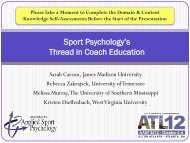Performance Excellence Movement - Association for Applied Sport ...
Performance Excellence Movement - Association for Applied Sport ...
Performance Excellence Movement - Association for Applied Sport ...
Create successful ePaper yourself
Turn your PDF publications into a flip-book with our unique Google optimized e-Paper software.
<strong>Per<strong>for</strong>mance</strong> <strong>Excellence</strong> <strong>Movement</strong><br />
that mind and body are intricately intertwined and, it is<br />
the somatopsychic and psychosomatic connections that<br />
sport and exercise psychology have been illuminating<br />
<strong>for</strong> decades. I believe there is such a thing as a “Good<br />
Body”, or one that enables thriving and contributes<br />
robustly to well-being. The human body is not simply a<br />
physical vehicle that houses higher order cognitive and<br />
affective functions: it is a source of competency beliefs<br />
and aesthetic beauty; an instrument of success and<br />
achievement; a mechanism <strong>for</strong> building psychological<br />
resilience and self-regulation; the enabler of sensual<br />
pleasure; and an ally in combating illness and<br />
psychopathology. As positive psychology continues to<br />
capture global attention and momentum, sport and<br />
exercise psychologists have a fertile opportunity to<br />
in<strong>for</strong>m the study of the good body and augment<br />
practices focused on supporting well-being.<br />
According to the World Health Organization<br />
(2004), insufficient physical activity accounts <strong>for</strong> $75<br />
billion dollars in healthcare costs. Exercise<br />
psychologists have been played a critical role in<br />
researching how to promote physical activity. Exercise<br />
has long established health benefits: it builds and<br />
maintains bone health, helps with weight control, builds<br />
lean muscle and reduces fat, lowers blood pressure, and<br />
decreases the risk of many chronic diseases, including<br />
diabetes and heart disease (Sallis, 2009). More recently,<br />
exercise and physical activity have also drawn much<br />
attention as a low-cost strategy to support mental<br />
health, by regulating mood, buffering stress, and as an<br />
effective method of preventing and treating<br />
psychopathology such as depression and anxiety (see<br />
Mutrie and Faulkner, 2004). Physical activity has also<br />
been researched as an avenue <strong>for</strong> restoring well-being<br />
in clients recovering from eating disorders, healing and<br />
adjustment after cancer, and coping with chronic<br />
conditions. <strong>Sport</strong> and exercise psychology practitioners<br />
can lend their expertise in the development of new<br />
interventions, evaluation of existing methods, and the<br />
administration of therapeutic programs.<br />
In the workplace, employee wellness initiatives<br />
have become increasingly popular among <strong>for</strong>wardthinking<br />
corporations who have realized that there is a<br />
connection between employee physical health and<br />
engagement, job satisfaction, and per<strong>for</strong>mance. Jim<br />
Loehr and Tony Schwartz published an article in the<br />
Harvard Business Review drawing parallels between<br />
business executives and world-class athletes. In order<br />
December 2009; Vol. 6(1)<br />
<strong>for</strong> executives to per<strong>for</strong>m consistently under<br />
pressure and have the stamina to sustain a high<br />
level of excellence, Loehr and Schwartz (2001)<br />
argue that they must train much in the same way<br />
as athletes by cultivating spiritual, mental,<br />
emotional, and particularly physical capacity. The<br />
demand <strong>for</strong> health and fitness coaches <strong>for</strong><br />
companies who provide wellness services <strong>for</strong><br />
employers appears to be on the rise. Healthy<br />
sleeping and eating habits and a routine of regular<br />
exercise are the foundations <strong>for</strong> building requisite<br />
physical strength, energy and stamina. Coupled<br />
with competencies in mental skills training and<br />
team development, sport and exercise<br />
psychologists can help others make better health<br />
decisions, adopt new exercise habits, and take<br />
better care of their physical and psychological<br />
health. Expanded competencies in coaching can be<br />
acquired through training programs offered<br />
through companies like Wellcoaches<br />
(www.wellcoaches.com).<br />
In schools, positive psychology practitioners<br />
have successfully delivered cognitive behavioral<br />
and strength-based approaches <strong>for</strong> supporting<br />
youth well-being to schools in the US, Australia<br />
and the United Kingdom, through programs like<br />
the Penn Resiliency Project. <strong>Sport</strong> and exercise<br />
psychologists have similarly argued <strong>for</strong> the social,<br />
psychological, and physical benefits associated<br />
with sport participation, and researchers like<br />
Steven Danish and Jack Watson have catalyzed<br />
interest in examining sport as a positive institution.<br />
<strong>Sport</strong> provides lessons on morality, character, fair<br />
play, life skills, and can be rich with opportunities<br />
to try on leadership roles, experience flow and<br />
positive emotion, and interact with peers<br />
(Donaldson & Ronan, 2006). With the economy<br />
and educational systems in crisis, physical<br />
education classes and extracurricular activities,<br />
like organized sport and music, are continually cut<br />
from schools. Further, community-based programs<br />
are distributed inequitably (see Eccles et al, 2003),<br />
making them even less accessible to marginalized<br />
and at-risk populations, where they could be<br />
making the greatest impact. Numerous nonprofit<br />
organizations, like Figure Skating in Harlem<br />
(www.figureskatinginharlem.org) have been born<br />
with the mission of using sport or physical activity<br />
to engage and protect youth, and similar programs,<br />
3






